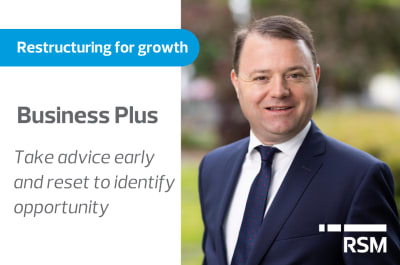After a difficult 18 months, the Irish economy still faces challenges. Following the withdrawal of government support measures, companies must now deal with inflationary cost pressures, supply chain issues, labour shortages and an uncertain economic outlook.
Many previously robust businesses are struggling to identify solutions to these issues, which is undermining their viability. In many cases, key stakeholders in businesses, notably management and equity investors, are finding themselves excluded from the capital structure. This often weakens performance and is a disincentive to future investment.
To ensure businesses are best positioned for a tough trading environment, all stakeholders’ interests must be realigned for the ‘new normal’.
How to review
Given the momentous changes affecting Irish businesses over the past 18 months, companies must review their performance to identify weaknesses in their business model and to set short and medium-term priorities. Considerations include:
CHANGES IN THE MARKET
The business environment can change quickly, from new competitors and innovations to a general slowdown in the economy linked to the pandemic and geo-political situation. The underlying themes for many businesses are the same – volatile trading, high input costs, and the inability to secure staff and key components. As a result, many businesses are reviewing their business models to identify new market opportunities, cost savings and opportunities to improve performance. This exercise should ensure your business is structured for the ‘new’ normal and is not simply based upon an outdated, pre-pandemic model.
PROBLEM CONTRACTS / SERVICES
Many companies have encountered serious issues with contractual obligations over the past 18 months, undermining their viability. These issues include significant delays to projects starting, inflationary pressures on fixed-price contracts, and being unable to recruit and retain the required staff. If the underlying business remains viable, a reorganisation of the contractual base can address the losses and ongoing costs associated with problem contracts.
PRESERVING BUSINESS VALUE
Losses associated with the pandemic combined with a variety of geo-political, economic and strategic issues have adversely impacted the value of many businesses, primarily due to a decline in EBITDA and any associated multiple. The associated value of a business can therefore be less than the value of the secured debt, meaning the secured lenders are the effective owners of the business. If the underlying business remains viable, a reorganisation addressing the levels of debt and operational costs may significantly improve the value of the business.
THE ‘NEW NORMAL’: APPROPRIATE STAFF LEVELS, FUNDING AND OPERATIONAL COSTS
The past 18 months have seen the Ireland adapt to the ‘new’ normal; working from home, home-schooling, lockdown, quarantine and wearing face masks in public – all of which have had a significant impact on personal, social and economic interactions. The ‘new’ normal requires companies to improvise and adapt to overcome its associated issues. A thorough review of company operations, with a view of the markets in which it operates and the general direction of travel, will highlight any issues.
UNSUSTAINABLE CREDITOR PRESSURE AND OTHER SUPPLY PROBLEMS
The government introduced moratoriums to prevent recovery action by creditors during the pandemic, and Revenue Commissioners offered generous deferrals and a Debt Warehousing Scheme which gave businesses vital breathing space. However, the Employment Wage Subsidy Scheme, which replaced the Temporary Wage Subsidy Scheme on 1 September 2020, ended on 31 May 2022. The Covid-19 Loan Scheme available to COVID-19 impacted eligible SMEs and small mid-cap businesses is due to close to new applicants on 31 December 2022. Companies must act now to address the mounting pressures.
UNDERSTANDING FREE CASH FLOW
At first glance, many companies seem financially healthy – trade is picking up and they have cash in the bank. However, many businesses have stretched creditor terms and built-up significant creditor arrears, including rent and
Revenue debts. Many cash positions are artificially high, and as trading normalises the unwinding of these arrears coupled with weakening performance will place significant strain on company cash flow. Many businesses are not equipped to prepare accurate forecasts to manage this process and inform their stakeholders.





